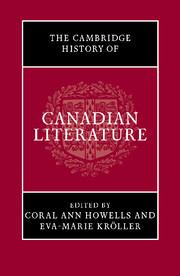Book contents
- Frontmatter
- Introduction
- PART ONE OLD AND NEW WORLD, LA NOUVELLE-FRANCE, THE CANADAS, DOMINION OF CANADA
- PART TWO THE POST-CONFEDERATION PERIOD
- PART THREE MODELS OF MODERNITY, POST-FIRST WORLD WAR
- 13 Staging personalities in modernism and realism
- 14 E. J. Pratt and the McGill poets
- 15 The 1940s and 1950s: signs of cultural change
- 16 The Centennial
- 17 Forms of non-fiction: Innis, McLuhan, Frye, and Grant
- PART FOUR AESTHETIC EXPERIMENTS, 1960 AND AFTER
- PART FIVE WRITING IN FRENCH
- Bibliography
- Index
- References
17 - Forms of non-fiction: Innis, McLuhan, Frye, and Grant
from PART THREE - MODELS OF MODERNITY, POST-FIRST WORLD WAR
Published online by Cambridge University Press: 28 September 2010
- Frontmatter
- Introduction
- PART ONE OLD AND NEW WORLD, LA NOUVELLE-FRANCE, THE CANADAS, DOMINION OF CANADA
- PART TWO THE POST-CONFEDERATION PERIOD
- PART THREE MODELS OF MODERNITY, POST-FIRST WORLD WAR
- 13 Staging personalities in modernism and realism
- 14 E. J. Pratt and the McGill poets
- 15 The 1940s and 1950s: signs of cultural change
- 16 The Centennial
- 17 Forms of non-fiction: Innis, McLuhan, Frye, and Grant
- PART FOUR AESTHETIC EXPERIMENTS, 1960 AND AFTER
- PART FIVE WRITING IN FRENCH
- Bibliography
- Index
- References
Summary
In one of his final interviews, Herbert Marshall McLuhan (1911–80) reflected on the people who had strongly influenced him. Harold Adams Innis (1894–1952), McLuhan claimed, “is the only man since the beginning of literacy 2,400 years ago who ever studied the effects of technology, and I think that is an amazing thing in view of the numbers of great minds that had this opportunity. He’s the only human being that ever studied the effects of literacy on the people who were literate.”
Harold Innis
A rural southwestern Ontarian by birth and upbringing, Innis graduated from McMaster University in History and Political Economy (BA, 1916), then enlisted and was sent overseas; the war in Europe was, for him, a deeply moral cause. “If I had no faith in Christianity I don’t think I would go, but it is as He said, you must desert everything take up the cross and follow me,” he wrote to his sister. The experience of the horrors of war, however, left him an avowed agnostic, robbing him of his Baptist faith and his plan to become a preacher.
Innis returned to McMaster for his master’s degree in Political Economy (1918), then went to the University of Chicago for his doctorate (1920). Under his supervisor, the economic historian Chester Whitney Wright, he wrote as his thesis, “A History of the Canadian Pacific Railway.” Although employment offers came his way, he declined these “on a chance that a Canadian university will send in an application.”
- Type
- Chapter
- Information
- The Cambridge History of Canadian Literature , pp. 335 - 354Publisher: Cambridge University PressPrint publication year: 2009



